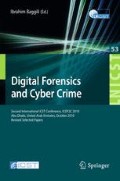Abstract
Among all the available approaches for software piracy forensics, one existing and exceptional approach is the theoretical frame work called AFC (Abstraction-Filtering-Comparison), an accepted approach in US courts for evaluating copyright infringement claims involving computer software. Through this paper, the authors would like to approach AFC in a threefold manner: One, to discuss the nature and efficacy of AFC; two, to recount some existing observations on it, and three, to identify areas, if any, where there is scope and need for appropriate modifications to further increase the efficacy and validate the legitimacy of the AFC approach, and in particular from the view point of a researcher who believes that software intelligence offered by the automated tools for software piracy investigation needs to be supplemented with manual intelligence for making the expert report more judiciary-friendly.
Access this chapter
Tax calculation will be finalised at checkout
Purchases are for personal use only
Preview
Unable to display preview. Download preview PDF.
References
Santhosh Baboo, S., Vinod Bhattathiripad, P. (under editorial review): Software Piracy Forensics: Impact and Implications of post-piracy modifications. Digital Investigation - The International Journal of Digital Forensics & Incident Response (2010)
van der Ejik, P.: Comparative Discourse Analysis of Parallel texts, eprint arXiv:cmp-lg/9407022. Digital Equipment Corporation, Ratelaar 38, 3434 EW, Nieuwegein, The Netherlands, CMP-lg/ 9407022 (1994)
Yamamoto, T., Matsushita, M., Kamiya, T., Inoue, K.: Measuring Similarity of Large Software Systems Based on Source Code Correspondence. IEEE Transactions on Software Engineering, XX, Y (2004)
Lancaster, T., Culwin, F.: A Comparison of Source Code Plagiarism Detection Engines. Computer Science Education (2004), http://www.informaworld.com/
Li, C.-T.: Handbook of Research on Computational Forensics, Digital Crime, and Investigation: Methods and Solutions. In: Information Science Reference, ch. XX (2010), http://www.info-sci-ref.com
Frantzeskou, G., Stamatatos, E., Gritzalis, S., Chaski, C. E., Howald, B. S.: Identifying Authorship by Byte-Level N-Grams: The Source Code Author Profile (SCAP) Method. International Journal of Digital Evidence 6(1) (2007)
United States Court of Appeals Judge John Walker, Protectable Nuggests: Drawing the Line Between Idea and Expression in computer Program Copyright Protection, 44. Journal of the Copyright Society of USA 44(79) (1996)
Spafford, E.H., Weeber, S.A.: Software forensics: Can we track the code back to its authors? Purdue Technical Report CSD–TR 92–010, SERC Technical Report SERC–TR 110–P, Department of Computer Sciences, Purdue University (1992)
European Software Analysis Laboratory, The SIMILE Workshop: Automating the detection of counterfeit software (2007), www.esalab.com
Raysman, R., Brown, P.: Copyright Infringement of computer software and the Altai test. New York Law Journal 235(89) (2006)
United States District Court of Massachusetts, Memorandum and Order, Civil Action number 07-12157 PBS, Real View LLC. Vs. 20-20 Technologies, p. 2 (2010)
United States Court of Appeals, Second Circuit, Computer Associates International, Inc. v. Altai, Inc., 982 F.2d 693; 1992 U.S. App. LEXIS 33369; 119 A.L.R. Fed. 741; 92 Cal. Daily, Op. Service 10213, January 9, 1992, Argued, December 17, 1992, Filed (1992)
United States Court of Appeals, Second Circuit, Corrected Amicus Brief filed by Mark M. Arkin, Counsel of 5 computer scientists regarding software copyright and trade secret cases – Observation of Abstraction, Filtration and Comparison test, on appeal from the United States district court for the southern district of New York, on the suit Harbour Software Inc. Vs Applied Systems Inc., 97-7197L (1997)
Hollar, L.A.: Legal Protection Of Digital Information. BNA Books (2002)
Santhosh Baboo, S., Vinod Bhattathiripad, P.: Software Piracy Forensics: Exploiting Nonautomated and Judiciary-Friendly Technique’. Journal of Digital Forensic Practice 2(4), 175–182 (2009)
United States Court of Appeals, Second Circuit, Brief of Amici Curiae of 17 technical experts, in the case Universal City Studios, Inc., et al. Vs. Eric Corley, A/K/A Emmanuel Goldstein and 2600 enterprises (2001)
Vinod Bhattathiripad, P.: Judiciary-friendly computer forensics, Kerala Law Times, Part 13 & Index, June 29, p. 54 (2009)
Davis, R.: The nature of software and its consequences for establishing and evaluating piracy. Software Law Journal 5(2), 317–325 (1992)
Kremen, S.H.: Presentation of Technical Evidence by Experts in Computer Related Intellectual Property Litigation. Computer Forensics Online 2(1) (1998)
Author information
Authors and Affiliations
Editor information
Editors and Affiliations
Rights and permissions
Copyright information
© 2011 ICST Institute for Computer Science, Social Informatics and Telecommunications Engineering
About this paper
Cite this paper
Baboo, S.S., Bhattathiripad, P.V. (2011). Software Piracy Forensics: The Need for Further Developing AFC. In: Baggili, I. (eds) Digital Forensics and Cyber Crime. ICDF2C 2010. Lecture Notes of the Institute for Computer Sciences, Social Informatics and Telecommunications Engineering, vol 53. Springer, Berlin, Heidelberg. https://doi.org/10.1007/978-3-642-19513-6_2
Download citation
DOI: https://doi.org/10.1007/978-3-642-19513-6_2
Publisher Name: Springer, Berlin, Heidelberg
Print ISBN: 978-3-642-19512-9
Online ISBN: 978-3-642-19513-6
eBook Packages: Computer ScienceComputer Science (R0)

